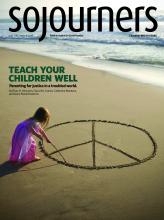Siham Abu Awwad grew up in a Palestinian family in a small West Bank village. When Siham was 14, her mother was imprisoned for six months for demonstrating against the military occupation of the West Bank. Siham became the woman of the house, caring for her four brothers—Khaled, Youssef, Ali, and Maha.
With their mother in jail, Siham and her brothers became very close. “We had a special place in each other’s heart,” she told me. Missing her mother, and with little time for friends, Siham became especially close to Youssef. “I told him everything. He was kind and sensitive. He was like a sister!”
When Siham’s mother returned from prison, she continued her political activism and was soon arrested again, but she maintained a sense of humor and challenged her children to be kind and good.
The establishment of a nearby Jewish settlement led to ongoing seizures of land from Siham’s village, and there were frequent protests. By the time Siham was 17, her mother and all her brothers had been in and out of jail for participating in the protests that are illegal under Israeli law. Knowing she would likely be imprisoned again and concerned for her daughter’s future, Siham’s mother encouraged her to marry. Siham did, and eventually gave birth to five children.
Youssef and Ali both married too, but happiness was short-lived. Two months after his wedding, Ali was shot in the leg by a settler. Doctors wanted to amputate his leg and feared he would not survive, but his mother arranged treatment in Saudi Arabia, where Ali’s life and his leg were saved. While preparing a celebration for Ali’s return, Youssef was shot and killed by an Israeli soldier at a checkpoint. “Youssef was our angel,” said Siham, “always with a smile.”
Read the Full Article
